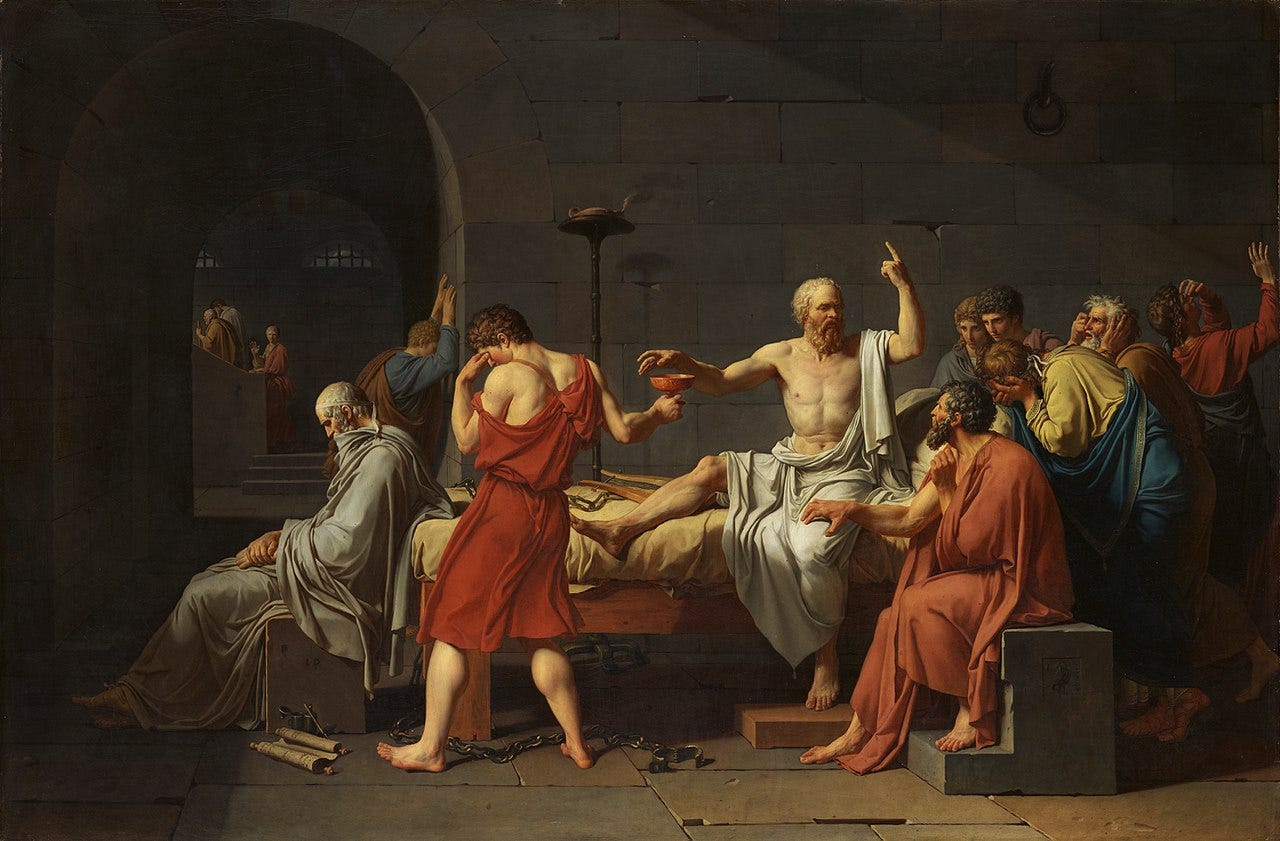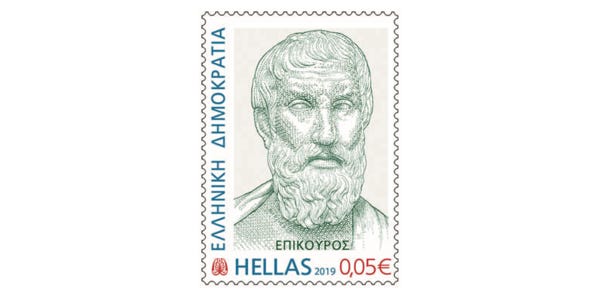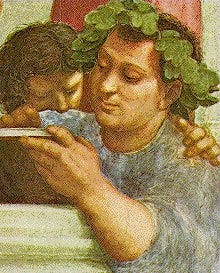
Hellenic Post (ELTA) issued a new stamp series on March 15, 2019 featuring Ancient Greek literary and philosophical figures — Herodotus, Euripides, Xenophon, Socrates and, Epicurus.
Disclaimer: This post is neither sponsored by nor affiliated with the World Beard and Moustache Championships.
Herodotus

Roman orator Cicero referred to him as "The Father of History", but Plutarch lambasted him for telling malicious lies, calling him an untrustworthy historian. What went wrong?
Herodotus was born in Halicarnassus (in modern-day Turkey) and lived c. 484–c.425 BCE. His single book The History (ancient Greek ἱστορία/historia or “inquiry”) examined the origins and events of the Greco-Persian Wars of the early 5th century BCE.
Herodotus’s method of “inquiry” — involving critical analysis of sources, interviews of eyewitnesses, first-hand examination of documents and sites, and documentation of these inquiries into straightforward prose — was a break from the Greek myth and the Homeric style of legendary epic as was tradition then.
Rather than sticking to facts, Herodotus told historical stories. His work (in narrative form) employed elements of mythological tales. That does not mean that his Histories is completely dismissible as there is still a lot of historical information to be gleaned from it.
Before you grab your pitchforks and start yelling “fake news!”, one of Herodotus’s descriptions in Histories was recently proven right — The Guardian reports that a team of archaeologists from the European Institute for Underwater Archaeology discovered more than 70 sunken vessels at the sunken port-city of Thonis-Heraclion, Egypt. One of these is a baris whose specifically Egyptian method of assembly was as described by Herodotus.
Euripides

Euripides of Athens (c. 480–406 BCE) was a tragic playwright—the third of the famous trio alongside Sophocles and Aeschylus. Euripides was not tragic in the sense that he led an unpleasant life. The word tragedy, refers to the most prestigious form of ancient Greek drama.
He wrote an estimated 92 plays. Of these, 18 (plus a play of unknown authorship mistakenly included with his works) have survived from antiquity (more than the plays of either Aeschylus and Sophocles). Among them:
The Cyclops
Alcestis
Medea
Hippolytus
Xenophon

Xenophon (c. 431–354 BCE) was an ancient Greek philosopher, historian, soldier, mercenary, and student of Socrates. As a soldier, Xenophon became commander of the Ten Thousand (Greek mercenaries) at about 30. As one of the Ten Thousand, Xenophon participated in Cyrus the Younger's failed campaign to claim the Persian throne from his brother Artaxerxes II of Persia. When Cyrus the Younger was killed, Xenophon led the retreat back to Greece.
Decades later, Xenophon recounted the events in Anabasis. The Anabasis has long been considered a classic and was said to be used by Alexander the Great as a field guide for his own successful campaigns in Persia.
“Alexander the Great would not have become great if there had been no Xenophon.” — Eunapius, Lives of the Sophists (VSI, 453):
But perhaps to be a historian is to have detractors (similar to Herodotus) — the Tumblr blog Xenophon is Sad has a wealth of compiled quotes holding Xenophon in contempt.
Xenophon also wrote portraits of leaders, practical treatises on horse training, hunting and running a household, etc. Among Xenophon’s most famous practical treatises is On Horsemanship, which is a guide how to train a war horse.
The one best precept — the golden rule — in dealing with a horse is never to approach him angrily. Anger is so devoid of forethought that it will often drive a man to do things which in a calmer mood he will regret.
As a student of Socrates, Xenophon wrote down his philosophical dialogues.
Socrates

Socrates (c. 470–399 BCE) was an Athenian philosopher credited as one of the founders of Western philosophy, and as being the first moral philosopher of the Western ethical tradition of thought.
Socrates never wrote anything down, so all we know about him is how he is described by others, mainly the philosophical dialogues written by two of his students, Xenophon and Plato. Because of this, no one knows if Xenophon and Plato represented Socrates’s views accurately or simply put words in his mouth and used him as a mouthpiece for their own ideas.
That said, Plato’s dialogues of Socrates are considered much more famous than Xenophon’s because Plato’s are a lot richer philosophically and as literary works while Xenophon’s were more about Socrates’s own memories.
Socrates famously said “the unexamined life is not worth living”. He saw himself as “the gadfly of Athens” whose job was to question everyone and hold them intellectually accountable. Later on he was charged with corrupting the youth, sophistry, and worshipping false gods, so he was put on trial and executed.

The Death of Socrates (1787) by French painter Jacques-Louis David depicts Socrates being sentenced to die by drinking poison hemlock.
Socrates was known for being “profoundly ugly, resembling a satyr more than a man” (like anyone has ever seen a satyr).
He had wide-set, bulging eyes that darted sideways and enabled him, like a crab, to see not only what was straight ahead, but what was beside him as well; a flat, upturned nose with flaring nostrils; and large fleshy lips like an ass. Socrates let his hair grow long, Spartan-style (even while Athens and Sparta were at war), and went about barefoot and unwashed, carrying a stick and looking arrogant. He didn’t change his clothes but efficiently wore in the daytime what he covered himself with at night.
For more information, refer to this Reddit comment to the question Did Socrates even Lift?
In Raphael's The School of Athens (1509-1511), Socrates is shown here:

One of the people he is seen speaking to is alleged to be his student Xenophon.
Epicurus

Epicurus (341–270 BCE) was Greek philosopher and sage who founded a highly influential school of philosophy now called Epicureanism. Thomas Jefferson considered himself an Epicurean. So what is it?
Often confused or associated with Stoicism, Epicureanism was an ancient school of philosophy. While Stoicism says that the only good thing is excellence and that the happy life is the life lived in agreement with nature, Epicureanism says that pleasure is the only good thing and that the happy life is the most pleasant life. This places Epicureanism to be a kind of hedonism. However, it’s important to note that Epicurean hedonism differs from the popular conception of hedonism.

Not this hedonism. There are many schools of hedonistic philosophy, of which Epicureanism is one.
For example, Epicureanism maintains that intellectual pleasures can surpass bodily pleasures and that the absence of pain (aponia) is the greatest pleasure.
Epicurus advised that people avoid politics wherever possible and he observed that happiness and love are at odds with each other, citing jealousy, misunderstanding, and bitterness. Instead, he placed an extremely high value on friendship.
All of this culminated in Epicurus purchasing a plot of land with a large house and invited all of his friends to come live with him in “the Garden”. In this hippie commune, the inhabitants of the Garden studied happiness by avoiding pain.
Epicurus is also in Raphael's The School of Athens, thought to be this:

References
https://www.elta.gr/Business/eshop/tabid/558/CategoryID/277/List/1/Level/a/ProductID/1346/language/en-US/Default.aspx
Belov, Alexander. “New Evidence for the Steering System of the EgyptianBaris(Herodotus 2.96).” International Journal of Nautical Archaeology, vol. 43, no. 1, Wiley, July 2013, pp. 3–9. Crossref, doi:10.1111/1095-9270.12030.
McGroarty, Kieran. “Did Alexander the Great Read Xenophon?” Hermathena, no. 181, 2006, pp. 105–124. JSTOR, www.jstor.org/stable/23041624.
Nails, Debra, "Socrates", The Stanford Encyclopedia of Philosophy (Spring 2018 Edition), Edward N. Zalta (ed.), https://plato.stanford.edu/archives/spr2018/entries/socrates/.
Konstan, David, "Epicurus", The Stanford Encyclopedia of Philosophy (Summer 2018 Edition), Edward N. Zalta (ed.), https://plato.stanford.edu/archives/sum2018/entries/epicurus/.

